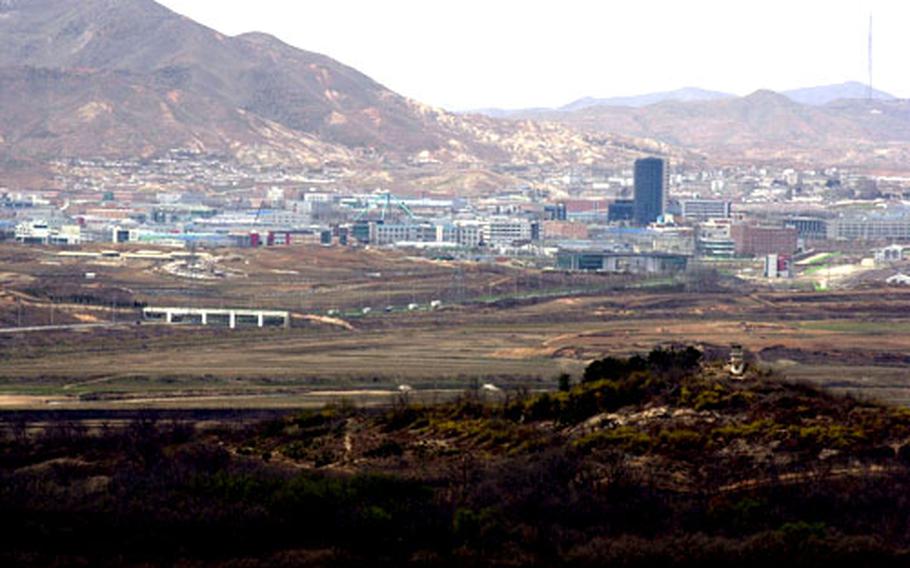Asia-Pacific
South Koreans continue work at complex despite North's recent threats
Stars and Stripes March 28, 2013

A caravan of vehicles from South Korea passes under a bridge en route to the Kaesong Industrial Complex in North Korea in April 2010. About 1,000 South Koreans work in the complex, which supports about 120 companies and more than 43,000 workers. (Jon Rabiroff/Stars and Stripes)
SEOUL — North Korea has certainly been doing a lot of saber-rattling lately, but it looks like money still trumps politics.
South Koreans continued to commute in and out of North Korea on Thursday to work at the Kaesong Industrial Complex, just north of the Demilitarized Zone, despite Pyongyang’s decision to cut off a military hotline used to coordinate their border crossings.
The complex serves as perhaps the last remaining symbol of inter-Korean cooperation. It could also be seen as a monument to hypocrisy.
The North has in recent weeks threatened to turn Seoul — and Washington, D.C. — into a “sea of fire.” But it continues to welcome hundreds of South Koreans across the DMZ every day to work at the complex, which generates an estimated $2 billion a year in revenue for North Korea and $80 million a year in income for its citizens.
Meanwhile, the South allows its citizens to commute into what could be harm’s way if the current tensions were to boil over.
A South Korean Ministry of Unification official said he saw nothing ironic in the ongoing arrangement.
“[North Korea’s] provocations and the Kaesong Industrial Complex are different matters,” he said. “Our ministry thinks the complex is a horse of a different color.”
At last count, close to 1,000 South Koreans travel three miles north of the heavily guarded border to work with more than 53,000 North Koreans, who provide cheap labor at a complex that is home to more than 120 South-owned factories and businesses.
North Koreans make an average of about $134 per month at Kaesong in the labor-intensive production of clothing, electronic equipment, kitchen appliances and other goods, officials have said.
The South Koreans workers are primarily in managerial positions. Most work three or four days a week there and, while some return home each day, many stay overnight for days at a time in dormitory-like accommodations at the complex.
Officials have said that while there are no armed North Korean soldiers at the complex, there is a “presence” of security personnel, and every business there has a North government official assigned to oversee and represent the local workers.
Workers there have said North and South Koreans employed at the complex are allowed to engage in small talk, as long as they avoid the subjects of government and politics.
The square-mile-plus complex was developed under former South Korean President Kim Dae-jung’s “Sunshine Policy” of promoting North-South relations and business opportunities. It opened in 2004 during the administration of then-President Roh Moo-hyun.
Since then, the fate of the complex has repeatedly been put into jeopardy by the ever-evolving relationship between North and South Korea — including in 2009 when the North closed the border in protest of joint U.S.-South Korean military exercises, stranding hundreds of South workers at the complex’s housing facilities for days until the crossings were allowed to resume.
North Korea has been at its provocative best in recent weeks, angry about United Nations sanctions over its recent satellite launch and nuclear test, as well as this month’s joint U.S.-South Korean Foal Eagle and Key Resolve military exercises.
Among other things the North has posted a video claiming it could take control of the South in three days, announced its military was “combat ready” to shell American bases all over the Pacific and the U.S. mainland; declared void the armistice that effectively ended the Korean War, and said it is no longer answering a Red Cross hotline used to coordinate activities at the Joint Security Area of the DMZ.
On Wednesday, the North stopped answering a second DMZ hotline, this one used by the militaries of the two countries to coordinate the movement of workers, equipment and manufactured goods to and from Kaesong.
“Under the situation where a war may break out any moment, there is no need to keep North-South military communication,” the North said.
Nevertheless, Unification Ministry officials said a Kaesong management official authorized Thursday’s border crossings.
Ministry officials said no additional security measures have been taken for Kaesong workers in connection with North Korea’s recent threats, nor would they speculate on what would have to happen for the South to suspend its cooperation in the complex.
“We can’t prejudge such circumstances…because it’s a hypothetical situation,” one official said under customary condition of anonymity.